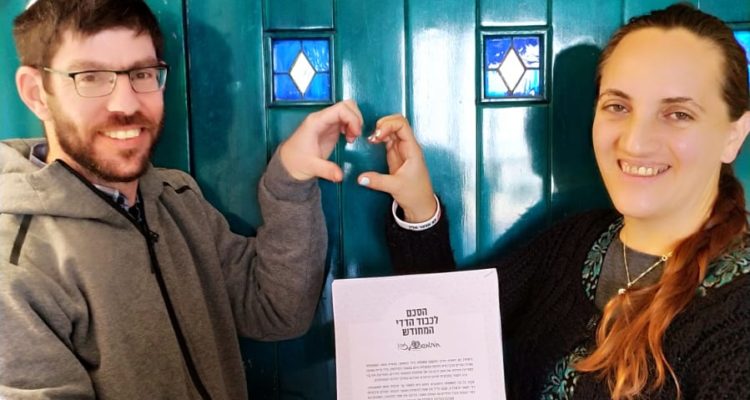It was that very challenge of being refused a divorce for years that brought Leah and Uriel together, offering them a unique perspective as they forge a new life together.
By Yehudah Barkai
There is no shortage of divorcees who find each other in part due to their mutual histories of complex marriages and breakups. But for one couple, who will join together under the chuppah (bridal canopy) this week, both new husband and wife were victims of ‘get refusal’.
A ‘get’ is a writ of Jewish divorce, and for it to take effect according to Jewish law, both sides have to agree. The husband presents his wife with the get at a rabbinical court, along with two witnesses, and she must accept it.
If one refuses – in most cases it’s the husband, but there are also women who have refused the get – the other one cannot remarry. In other words, he or she cannot move on. For that reason, a Jewish woman in such a predicament is called an agunah – a chained woman.
Indeed, it was that very challenge that brought Leah and Uriel together, offering them a unique perspective as they forge a new life together.
Leah and Uriel both describe themselves as victims of complicated relationships that resulted in messy breakups. In both cases, they were subjected to a spouse who refused to accept the proposed terms of the divorce, keeping them trapped in a failed marriage.
After protracted legal struggles, which for Leah included representation by Ohr Torah Stone’s Yad La’isha Monica Dennis Goldberg Legal Aid Center, Leah and Ariel were finally able to gain freedom and the promise of new lives together.
Just a few months ago, Uriel found himself scrolling through Facebook when, he says, something drew him to a post by Leah, a woman he had never met, in a group for divorced parents. He quickly reached out to her, asking her to ‘friend’ him on the social network.
Uriel, who lives in central Israel, is the father of two children and works as an account manager. Leah lives in the north of the country and is a mother of five. After getting to know each other online, they realized how much they had in common, but what truly solidified the bond was the fact that Uriel had gone through three years struggling to free himself of his previous marriage while Leah had been denied a get for five years.
“This was truly a case of instant love, because someone who has emerged from the trauma of get refusal and remains with a positive outlook on life is certainly a person of strength and someone that, both of us realized, we would want to spend the rest of our lives with,” Leah said.
After a short time of getting to know each other, they decided that they would marry. “Certainly there was concern amongst our families, after all that they had witnessed us go through. But we all appreciated that this time was different.”
With their common past, and understanding the realities of how relationships can change over time, Leah and Uriel readily agreed to sign a halachic (Jewish legal) prenuptial agreement that is drafted to prevent the issue of get refusal. They also went to pre-marital counseling sessions. “Our common experience allows us to act differently this time around so we can avoid those problems,” they said.
“There is no doubt that we both have concerns for what could be because of our mutual past, but we can’t allow our lives to be guided by that fear. With Leah, I feel like a new person, and this is truly the first time in life that I want to unconditionally love someone else,” Uriel said.
Pnina Omer, director of Yad La’isha, congratulated the couple saying, “This is a moment which should give every person who has had to experience these traumas real hope. We accompanied Leah through very trying times until she was freed, so there is a definite sense of ‘closing a circle’ as we help her and Uriel through the phase of preparing for their new lives.”
Omer said that the couple can certainly serve as role models for others. “In signing the halachic prenup, both Leah and Uriel are ensured freedom even if the marriage should dissolve. When a couple signs this agreement, it is a reflection of true love and responsibility for each other, something which needs to exist in every Jewish marriage.
“There is no doubt that when we see joy like that shared by Leah and Uriel, we are motivated and encouraged to continue to fight on behalf of others who are going through the challenges of get refusal. These cases prove there can be happy endings to even the toughest cases.”





